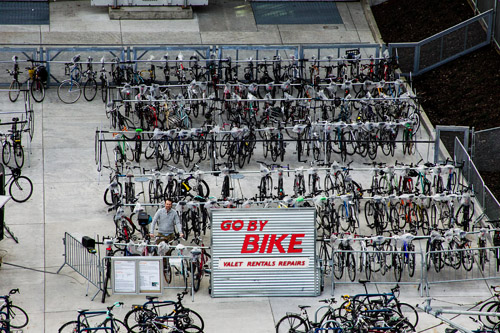Why are there so few transportation startups in Portland? The city’s leadership in bike, transit and pedestrian transportation has been well-documented. But that was then — when government and nonprofits paved the way for a new, less auto centric way of life.

Why are there so few transportation startups in Portland?
The city’s leadership in bike, transit and pedestrian transportation has been well-documented. But that was then — a time when government agencies and nonprofit organizations paved the way for a less auto-centric way of life.
Times change. We live in an entrepreneurial era. The private sector is driving a new wave of transportation options, at least in other parts of the country.
“This is the most exciting time for urban transportation in my lifetime,” said Gabe Klein, a former Zipcar chief during the National Association of City Transportation Officials summit in San Francisco last week. He was referring in part to Uber, Lyft, Bridj and other smart mobility companies that have inspired thousands of people to rethink the way they get around in cities.
Not to downplay the number of PDX businesses that have sprung up around alternative transportation: Portland Pedicabs, Go By Bike and Pedal Bike Tours, to name a few. GlobeSherpa brought TriMet into modern era with mobile payments. In Oregon, electric vehicle companies abound.
Nor do we lack for great ideas. On October 27, the Oregon Transportation Research Consortium held a “fearless” transportation event showcasing innovative ideas like running ferries across the Willamette River and turning Portland’s most dangerous intersections into car free spaces on the weekends.
An Intel engineer proposed an open source bike sharing plan.
But for a city that helped pioneer the car sharing business model more than a decade ago, movement on the transportation startup front seems disappointingly slow. Many new enterprises still revolve around transportation as a thing (a car, a bike) rather than mobility as a service.
The city’s few service oriented startups have struggled. Earlier this week, Alta Bike Share sold off its bike share division to a group of private investors in New York.
That deal was pegged at $40 million.
Maybe Portland lacks the capital, the startup ecosystem, as it were, to support a mobility cluster. After all, we still can’t find a corporate sponsor for bike share, even though the city’s health care organizations would be a natural fit. So would a Puppet Labs or Elemental Technologies, software companies that have made bikes central to their recruitment and retention strategies.
Maybe we are too wedded to the idea of transportation as the stomping ground for planners and advocacy groups, not entrepreneurs.
Urban transportation is an odd beast. On the one hand, more efficient solutions depend on scaling modes that have been around for a long time: bikes, buses, walking. On the other: smart technologies are making old ways of getting around new, relevant and sexy for the next generation.
Perhaps Intel — and OTREC — will spin off a new wave of mobility companies. Perhaps a donor with deep pockets will launch a Knight Cancer Challenge for smart cities.
Because I agree with Klein. This is the most exciting time for urban transportation in my lifetime.


